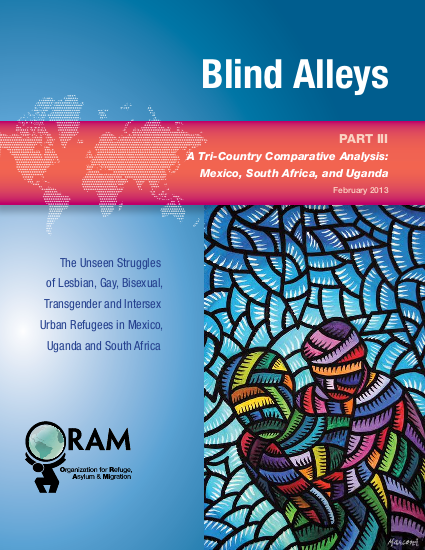
Sexually and gender non-conforming (SGN) individuals are among the most vulnerable forced migrants in the world today. Persecuted by their families, communities, and gov- ernments in dozens of countries worldwide, they escape across international borders, often to find themselves shunned, abused, and persecuted yet again. While complete or accurate data on the numbers and demographic distribution of SGN refugees will likely never be available, it appears that most flee to urban centers. There, they often find environments no more tolerant than the ones they fled. They seek relative safety through isolation and anonymity. Blind Alleys is a hallmark multi-country investigation of the protection of SGN urban ref- ugees. In the disparate urban environments of Mexico, Uganda, and South Africa, ORAM’s research found clear patterns of dangerous protection gaps. Our findings detail how SGN ref- ugees are doubly marginalized: first because they are refugees, and again based on their sexual orientation and/or gender identity. This extreme marginalization renders these refugees par- ticularly vulnerable to abuses by state and private actors alike. In all three of the countries ex- amined, the refugees face discrimination and/or violence by state authorities, albeit with vary- ing levels of severity. This mistreatment includes arbitrary arrests, beatings, sexual violence, extortion, and harassment. The same refugees also report suffering discrimination and abuse from locals and other refugees. Our findings bear out that for SGN refugees, crippling isolation is related to barriers accessing health care, employment, and other vital services. This Part III of Blind Alleys provides an overview of our findings, along with a broad sum- mary of our recommendations to stakeholders including governments, NGOs, and the United Nations High Commissioner for Refugees (UNHCR).